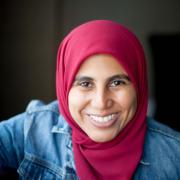An interview with Yvonne Maffei: Food Writer & Culinary Educator in the Muslim Community
Author:
As a mother of three young children and a public health practitioner, I was drawn to the Yvonne Maffei’s blog: “My Halal Kitchen”. In amongst her recipes are insights on developing wholesome and healthy family eating traditions. She publishes sumptuous recipes, full of fruits and vegetables and her Instagram page is a treasure trove of advice for home gardeners. Yvonne Maffei, was born and raised in small-town Ohio in the heartland of America. Being half Sicilian and half Puerto-Rican, she grew up with a rich tradition of eating homemade food from two cultures. Her blog embraces not only her cultural heritage, but also that of the diverse American Muslim community.
As I worked with MomsRising and Values Partnerships to develop a Healthy Ramadan Guide, I reached out to Yvonne to ask for her insight.
The following is from an interview I had with Yvonne, where she spoke about her rich cultural heritage and her role as a culinary educator within the Muslim community.
When I became a Muslim over ten years ago, I was excited to learn about the guidelines set forth in the Quran as it relates to what a Muslim should and should not eat.
I was drawn to the descriptions of food such as olives and pomegranates in the Quran, foods I had grown up with and had learned were good for me. As I came into the Muslim community however, I saw a growing trend of halal processed food, foods that I knew were fine in moderation, but were becoming prominent in the diets of Muslim children. Within the Muslim community, halal is used to describe what is permissible both in food and in actions. The Quran encourages us to not only eat what is permissible (halal), but also what is wholesome (tayyib).
Although my teenage years were a struggle to balance food and weight loss, I was fortunate to have visited Italy as a teenager and by eating traditional, homemade food growing up, I developed health-conscious eating habits as a young adult. These experiences morphed into a consciousness about food consumption in accordance with Islam.
When I worked as a teacher in Islamic schools, I noticed kids eating lunches full of sugar, salt, high fructose corn syrup and other highly processed ingredients. There was also a growing epidemic of eating disorders, particularly among young girls. It concerned me greatly that the concept of halal eating had strayed far from the Quranic concept of healthy and wholesome eating.
Taking Action
At one point early on in my career as a food writer and culinary educator, I worked with a Muslim school to change the lunch menu from processed foods that lacked fresh fruits and vegetables, to one that would provide freshly cooked meals with colorful salads and healthy ingredients from local sources. We worked with the kitchen staff, the parents and food vendors to create a new lunch environment. In hindsight the program may have been prematurely introduced without having the full support of the teachers, parents and community to educate and encourage long-lasting healthy eating habits with children at school as well as at home. If I could do it now, I would work on getting more support from parents and teachers in order to make a greater impact. I would also incorporate an edible school garden so that the children could learn about the plants, help grow and harvest, learn to cook and the literally enjoy the fruits of that labor. It’s truly my dream project that I’d love to help every Muslim school incorporate.
As I focused my work on being a food writer and a blogger, I incorporated these lessons into the recipes and blog posts I wrote. I encourage families to eat their own traditional foods they grew up eating by thinking back to how their parents and grandparents ate, with nutrient-dense whole foods. Every culture, every geographic region of the globe has been sent foods that are good and pure and we can reach back to our heritage for answers and also find local food sources to the do same.
I believe Muslims should be leading the pathway towards conscious eating. Our faith has guidelines that encourage wholesome eating. The Quran encourages us to appreciate the natural world Allah swt (God) has provided us and the miracle of everything He has created. Clean eating, truly halal eating is a way for us to reconnect with our faith and to come back to our traditions. I see a growing consciousness daily in the Muslim community about these issues and I’m hopeful the tide will turn towards a more proactive approach on what we put in our bodies and how we feed our families.
Yvonne joined MomsRising #GFFRamadan Tweetchat on July 8 at 3pm EST. She answered questions about the growing movement within the Muslim community to ensure our kids are eating healthy and wholesome diets. Click here to read her and the other co-panelists' tweets.



The views and opinions expressed in this post are those of the author(s) and do not necessarily reflect those of MomsRising.org.
MomsRising.org strongly encourages our readers to post comments in response to blog posts. We value diversity of opinions and perspectives. Our goals for this space are to be educational, thought-provoking, and respectful. So we actively moderate comments and we reserve the right to edit or remove comments that undermine these goals. Thanks!